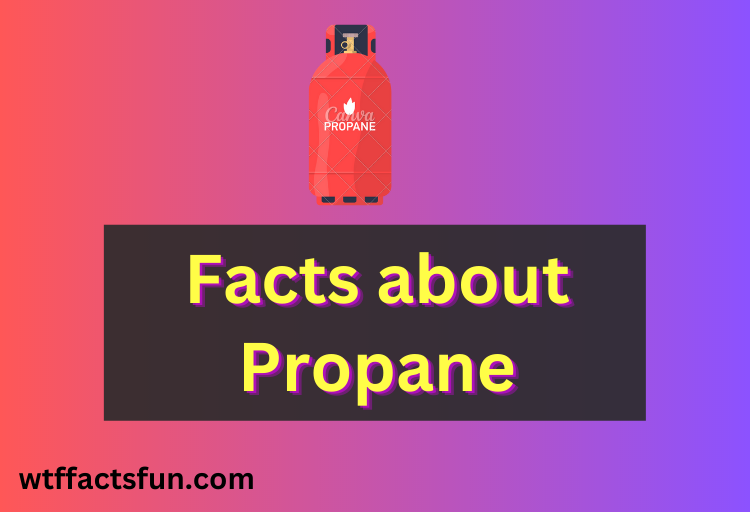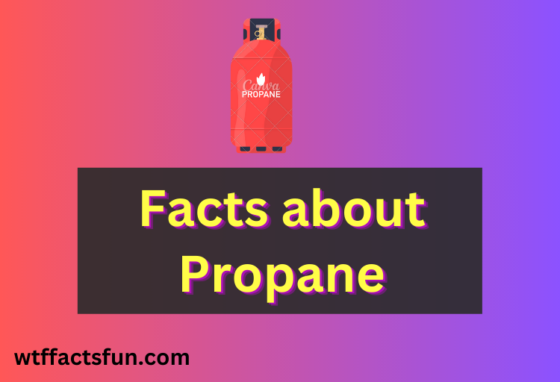
Facts about Propane
Facts about Propane: Propane is a flammable hydrocarbon gas that is commonly used as fuel for heating, cooking, and other applications. It is a colourless and odourless gas in its natural state but is typically mixed with an odorant to make it easier to detect in case of a leak. In this article, we will explore the facts related to propane.
- Propane is a byproduct of natural gas processing and crude oil refining.
- It is a clean-burning fuel that produces lower emissions than other fossil fuels like coal and oil.
- Propane is stored and transported as a liquid under pressure, and it vaporizes into a gas when it is released.
- The boiling point of propane is -42.1°C (-43.8°F) at atmospheric pressure.
- Propane has a high energy content, which makes it a popular fuel for heating and cooking.
- Propane is also commonly used as fuel for vehicles, including buses, trucks, and forklifts.
- Propane is often used in rural areas where natural gas is not available.
- Propane is used in a variety of industrial applications, including metal fabrication, welding, and glass manufacturing.
- The odorant added to propane to make it detectable in case of a leak is called ethanethiol or mercaptan.
- Propane is flammable and can be dangerous if not handled properly, so it is important to follow proper safety procedures when using propane.
- Propane is a non-toxic gas, which means it is not harmful to humans or animals if inhaled in small quantities.
- Propane can be used as a refrigerant in some applications, such as in air conditioning systems and refrigerators.
- Propane is often used in remote locations where electricity is not available, such as in camping stoves and RVs.
- Propane is an important fuel for agriculture, where it is used for crop drying, pest management, and weed control.
- Propane has a lower boiling point than water, which means it can be easily vaporized and used as fuel for heating and cooking.
- Propane can be used as a backup power source in case of a power outage, as it can power generators and other equipment.
- Propane is a versatile fuel that can be used in a variety of applications, including heating, cooking, transportation, and industrial processes.
- Propane is a cost-effective fuel compared to other alternatives, making it a popular choice for many homeowners and businesses.
- Propane is often stored in large tanks on residential and commercial properties, which can be refilled by propane delivery trucks.
- Propane is a renewable energy source, as it can be produced from renewable sources like biomass and waste products.
Advantages of Propane
Some advantages of propane are:
- Clean-burning: Propane is a clean-burning fuel that produces lower emissions than other fossil fuels like coal and oil, making it an environmentally-friendly option.
- Versatile: Propane can be used for a variety of applications, including heating homes and buildings, cooking food, fueling vehicles, and powering industrial equipment.
- Efficient: Propane has a high energy content, which means it produces more heat per unit of fuel than other fossil fuels, making it an efficient and cost-effective option.
- Reliable: Propane is a reliable fuel source that is available even during power outages, making it a popular choice for backup generators.
- Safe: Propane is non-toxic, and when handled properly, it is safe to use. Additionally, propane tanks are designed with safety features to prevent leaks and fires.
- Easy to store: Propane can be stored in tanks on residential and commercial properties, making it easy to access and use as needed.
- Renewable: Propane can be produced from renewable sources like biomass and waste products, making it a renewable energy source.
- Low maintenance: Propane equipment requires minimal maintenance compared to other types of equipment, making it a convenient option for homeowners and businesses.
Effect of using propane on the Environment
Like any fuel, the use of propane can have both positive and negative effects on the environment. Some of the positive effects of using propane include lower greenhouse gas emissions compared to other fossil fuels, as well as the ability to produce propane from renewable sources like biomass and waste products.
However, the use of propane can also have negative effects on the environment, such as the release of pollutants and greenhouse gases during the production, transportation, and use of propane. Additionally, leaks or spills of propane can cause air pollution and contribute to climate change. It is important to use propane responsibly and ensure that it is properly stored, transported, and used to minimize its impact on the environment.
FAQs on Facts About Propane
What is an interesting fact about propane?
An interesting fact about propane is that it was first identified as a component of natural gas in 1910 by Walter O. Snelling, a chemist at the U.S. Bureau of Mines. Propane has since become an important fuel source for a variety of applications.
What are the 4 uses of propane?
Four uses of propane are heating homes and buildings, cooking food, fueling vehicles, and powering industrial equipment. Propane is a versatile and efficient fuel that can be used in many different applications.
What are the 3 products of propane?
Three products of propane are propylene, propane-1,2-diol, and acrylonitrile. These chemicals are used in a wide range of applications, including plastics manufacturing, antifreeze production, and the production of synthetic fibres.
What colour is propane?
Propane is actually a colourless gas in its natural state and does not have any inherent colour. However, for safety reasons, a distinctive odorant is added to propane to help detect leaks.
Who uses propane and for what purposes?
Propane is used by a wide range of industries and individuals for various purposes, including heating homes and buildings, cooking food, fueling vehicles, and powering industrial equipment. It is commonly used by rural residents and businesses where natural gas is not available, as well as by farmers for crop drying, pest management, and weed control. Propane is also used by outdoor enthusiasts for camping and recreational activities.
Final Words:
In conclusion, propane is a versatile and widely used fuel that has many different applications. While it can be a safe and reliable source of energy when handled properly, it is important to follow proper safety procedures to prevent accidents and ensure the well-being of those who use it. We hope you have liked the article Facts about propane.
Read also:
21 Fun Facts About Ducks For Preschoolers

